#twenty years after
Text
In my lit theory clas we discussed a certain key in which all literature (which is also a part of the gay&lesbian theory, one of the newer schools of thought in this field) could be read, and that is a so called homotext. A homotext is a text in which there is no need to have a homosexaul/romantic character appear – the most important aspect is if the figure „speaking” to us through the text is homosexual/romantic one (a figure speaking through the text is not necessarily the narrator, nor the author, but I simply do not want to turn this post into a lit theory lecture). All we need to know now is that this figure must appear to be closely woven into the text, and try to communicate with its recipients (the readers) through so called secret signs. To be able to discover this figure and its secret language we need to be extremely careful and meticulous during our readings, to try to uncover the mystery and solve what is almost a riddle.
The theory of a homotext lists 5 signs we need to look for (I’m keeping the male-centric language, because it pertains to the books I’m going to discuss later):
Male body described in a peculiar manner. It means that the body might be very improtant, or described in great detail, or be the focus of the story, or be very different (extremely ugly or extremely beautiful, disfigured, unearthly, unhuman, not in keeping with the story etc. It would depend on each specific text, I imagine).
Eros and Thanatos – Love and Death – must be linked together somehow in the story.
A love triangle consisting of 2 men and 1 woman must appear. What is important (apprently) is that the men never consumate their own desires (there is no sex or love affair in the usual sense of the word) between them.
The action of the story moves at some point from a center to outskirts/peripheries. It means hiding, or abadonement, or a mystery disappearence etc.
The two men in question must share some secret reading between them – a language that only they two understand, or reading a book together, or one teaching something to the other etc. Something that pertains to reading and is specific to them only.
Because I was already in my D’Artagnan Romances insanity era by the time I was studying this, I began to look at the trilogy through the homotext lens and you might be either surprised or delighted, but the relationship between Athos and Aramis fulfils every point on that list and then some. Here goes:
1. Dumas did not really describe his characters in great detail, but he did describe some of their features, sometimes in such a great detail it comes off as a surprise to readers. Because I cannot, for the life of me, imagine why would we need all that he says about Athos’ beautiful hands, and handsome, noble face if we don’t even actually learn his name. Yet he describes the hands and nobility radiating from Athos as if his life depended on it. Aramis, on the other hand, has a bit more attention focused on his appearance, and for a reason, since he’s the pretty one. So much so that many adaptations only focus on that, because Aramis is also so many other things, but! He is described as short, strongly built and beautiful. There is also a great amount of instances of his blushing in the first book, or of his biting his lip in the third one (to say nothing of his habit of pinching his ears so that they are read, and putting his hands upwards so that they look white, or of his almond paste he uses to make himself look, again, pale and beautiful. He is extremely foused on his appearence). He is, on the whole, percieved through the way he looks to the world, which is deceptive to the readers (and his fellow characters), because while he may look angelic, his nature is decidedly more sinister. Another amazing detail – which @widevibratobitch made me aware of in her amazing tags one day – is that, being a man in a certain epoch and place, Aramis was all but required to sport a mustache; but his’ is very small and thin (and he kept it that way even when the fashion changed, it was mentioned in Twenty Years After if I recall properly), which points again in the same direction: Aramis is a man, and does a lot of typically manly things like being a soldier, being a priest and so on. But he is also feminine-coded, and in such a way that it must have been obvious to anyone who knew him: ’Aramis, you know,’ continued Athos, ‘is naturally cold, and then he is always involved in intrigues wih women.’
2. Eros and Thanatos, linked together, are what plagues Athos from the very beggining of the first book (even if we don’t know this at first, there are signs: mostly in the fact that he does not have a mistress and is a melancholy drunk etc.), and that is the easiet point to make. But there are more. First of all, they all are linked with death by profession, but only Aramis and Athos became Musketeers because they killed someone, or believed they killed someone. Their new paths in life are therefore marked by both Eros and Thanatos – the women they were besotted with and the subsequent deaths they caused. Neither of them has a lover is what we believe at first, because Athos truly does not have anyone and Aramis plainly states he is following in his footsteps (lying through his teeth, of course). There is also another thing: while in world of the novel d’Artagnan must have learned all of his friends’ true names, presumably once he became the lieutenant, the readers were kept in the dark right until the moment d’Artagnan observes the rendez-vous beetwen Aramis and madame de Longueville. We learn his christian name is Rene through her lips (Eros), and d’Artagnan’s ears (Thanatos, since that was the decisive moement in their relationship and shifted d’Artagnan from fondness to disdain); not to mention the name itself means born again, which is as much a jab at his life and profession, as a thing linking him with death (Aramis is the only one who kills with pleasure, and one could argue intrigues – at times resulting in very violent outcomes – are his pastime). I find it interesting, that in the second book (which is when the relationship between them both starts to get truly interesting) Athos likewise has begun a new life, and that new life means for him an increased acquaintance with Aramis, with whom he stayed in contact, while the contact with Porthos and d’Artagnan was either severed or lost altogether.
3. This is arguably the funniest point on that list: Aramis is a lover of Marie de Rohan, duchess de Chevreuse, ever since the beggining of the novels, which comes about very quickly, and is even a source of amusement (plus a spiritus movens) – Athos meanwhile disdains women. But in Twenty Years After we learn that he has gotten a son, and then we learn that Raoul’s moter is Marie de Chevreuse. With whom he slept because he thought she was a man at first, but that does not change the fact Marie is the woman in this equation, linking Aramis and Athos together, linking them even more than what is needed in the theory, since they both slept with her. There is also a smaller instance of Aramis repeating the very words madame de Longueville told him at the beggining of the book to Athos at the end of it (yes, it’s a political statement, but what we focus on is that Dumas chose to repeat this phrase between two lovers and put them in an exchange of two-perhaps-lovers).
4. So we all know that at the end of the first book Aramis takes some sudden trip to Lorraine and hen he up and disapears and then becomes a priest, and Athos inherits a property and leaves Paris as well, if in less mysterious circumstances. But how does this move the plot if it happens at the end of the novel? Well, in my opinion, it moves the plot to recenter it in the second book with a much richer configuration. The whole of the first book is so to speak through d’Artagnan’s gaze, and in terms of reading and getting to see the story develop it is rather constraining. Twenty Years After – not to mention this silent, 20 years long, break they took – allows the character more movement, and it creates new paths their relations ar taking. Aramis and Athos have both moved away from the capital, and it allowed them more room for growth together – which is why they are now frondists together and honestly, in no book of the three but this one is their relationship so fully developed, folly portrayed and so interesting to discover. And in terms of just Aramis, his life changing from the king’s bodyuard to a priest (so from a sort-of public life to a more private one, moving to the outskirts of the material world) is what allows them to build his character in the third volume, which resonates with Athos’ story a little bit, because his status as a bishop with realistic expectations ofbecoming a cardinal later in life moves him a little bit closer to Athos’ status as an aristocrat.
5. This one might be a stretch, but I don’t care: they are the only two of the four who speak Latin. (But also! In Twenty Years After they exchange letters d’Artagnan is not privy to – they are even kept from him on purpose – and these letters are secret, because they are rebels.)
#go ana analyze your favourite novels now#the three musketeers#twenty years after#the viscount of bragelonne#aramis#athos#ad i did NOT include quotes to back up my reasoning because 1 it already took me 3 days to finish & 2. what are you a tumblr post police?
71 notes
·
View notes
Text
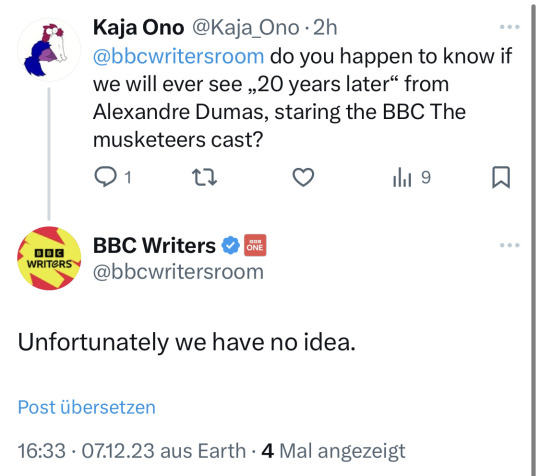
*pokes BBC with a stick* come on, do something
The idea not mine btw, someone here had it first but I thought, why not asking the BBC about it? Right now I try to find the account who had the idea first, here on tumblr.
40 notes
·
View notes
Text
“Why, how extraordinary!” said Porthos, slowly raising his head and looking at his friends with an air of astonishment, “I understand English, then! I understand what you say!”
“That is because we are talking Spanish, my dear friend,” said Athos.
Alexandre Dumas, Twenty Years After
11 notes
·
View notes
Text
Three Musketeers fans, please consider:
Athos with a baby.
I don't recall the exact circumstances under which he obtained Raoul, and I don't want to read Twenty Years After right now to remember them, because it makes me sad, so let's go with the fairly standard baby-in-a-basket-on-doorstep route. Here's how I think it would go.
Part I:
You are a tenant of the Comte de la Fère, who recently returned from five years of Mysterious and Probably Violent Activities to take up his ancestral position again. Nobody really knows what he's like anymore, so all his tenants/vassals are treading fairly lightly around him. So far, nobody's sure if he's going to drink himself into an early grave, or pick a quarrel with the wrong eight guys and get himself killed, but those are pretty much the only two options anyone is considering.
It is the middle of the night. You are woken by hammering on the door.
You go downstairs and the person who is hammering on the door like a madman is the Comte. He is wearing a nightshirt and a sword.
He is holding a baby.
His eyes are approximately the size of saucers. "Someone left him on the doorstep," is all he says, and he appears to think that this is an adequate explanation for why your liege-lord is standing on your doorstep in the middle of the night with a baby and a sword.
You decide to get your wife, because you are in no way equipped to handle your (definitely not panicking) lord and a baby on your own at this hour of the night.
Your wife immediately corrects how the Comte is holding the baby (his baby??) and you want to sink into the floor because you have no idea how he's going to take that kind of unsolicited advice, but the Comte is watching her like she's a divine revelation, and as soon as he's holding the baby to her satisfaction, he starts staring down at the kid with a ridiculously smitten expression on his face.
You decide to ask no questions.
Part II:
Now that Athos knows how to hold the baby, he is never going to put the baby down. Ever. Doing paperwork? Holding the baby. Riding into town? Holding the baby. Meeting with his tenants? Holding the baby.
He also talks to him exactly like an adult, because Athos has no framework for how to talk to someone who is not an adult. Baby Raoul has a very precocious vocabulary (no, I don't mean swearing; Athos NEVER swears in front of the child: I mean that he's the kind of five-year-old who uses words with more syllables than he is old).
The wife of our frazzled tenant above decides, at some point, to give the Comte a baby sling, because look, you can't do everything one-handed even if you are ambidextrous.
Athos now wears the baby everywhere. Somehow, he manages to look dashing while doing so. Half the unmarried ladies in the locality and a few of the married ones lose their hearts to him irrevocably, because it's a rare man who can look dashing while wearing a baby in a sling. Athos is completely ignorant of this because he's busy looking at Raoul.
Part III:
Because we live in a world where the Inseparables did NOT go without seeing each other for twenty years, Aramis, Porthos, and D'Artagnan find out about the baby. (Reader's choice: this can be because Athos wrote a panicking letter to them shortly after finding the kid to see if any of them knew what to do with a child, or because the four of them got together for a visit and Athos just. Was holding a baby.)
Of course, Raoul now has three devoted uncles, although everyone likes to tease D'Artagnan that the real reason Athos obtained a child was because he thought D'Artagnan needed a little brother. Uncle Porthos throws him in the air and Athos almost faints on the spot. Uncle Aramis teaches him to use his (unfairly cute) face to the BEST advantage possible.
Uncle D'Artagnan accidentally teaches him to swear. Athos does not find out about this until there is some accident and Raoul spits out a series of rather vehement oaths in front of him. D'Artagnan hears Athos yell and promptly flees. Aramis and Porthos watch with popcorn as Athos chases him over hill and dale until he catches him and threatens him with dismemberment if he EVER says ANYTHING like that around Raoul again.
D'Artagnan tries to blame Porthos.
It does not work.
Part IV (beware of spoilers for the end of the series):
In this AU, needless to say, Raoul does not go get himself killed in battle and Athos does not die of grief. The Inseparables plus Raoul all live to a very happy old age.
#the three musketeers#athos#raoul#d'artagnan#porthos#aramis#winter says things#ficlet#fanfic#my writing#twenty years after#the inseparables
73 notes
·
View notes
Text
Book!Porthos: I may not be the sharpest tool in the shed
Book!Porthos: But that's why we have bludgeoning damage
#the three musketeers#alexandre dumas#porthos#porthos du vallon#lol#original post#incorrect quotes#musketeers#twenty years after#the man in the iron mask
39 notes
·
View notes
Text
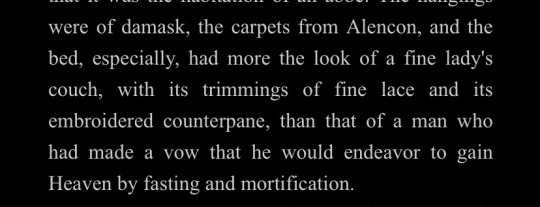
obsessed with d’artagnan talking shit about aramis’ gay ass bed
#musketeers#the three musketeers#d’artagnan#aramis#twenty years after#ive witnessed a hatecrime#also him going lol you still have ur feminine hands#aramis is trans d’artagnan you cant say that!!!!
19 notes
·
View notes
Text



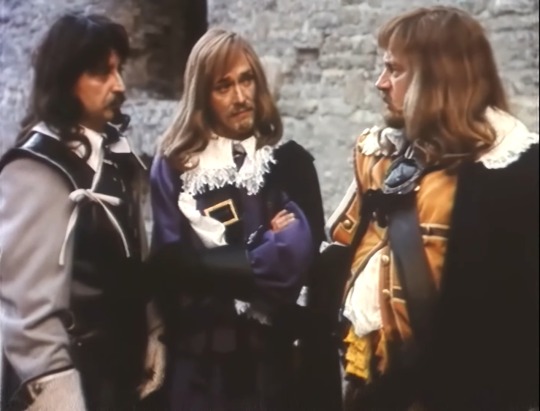
cunt.
#amidst all this t/error and o/pera posting lets not forget what's truly important.#aramis. and igor starygin's cunty little face in his cunty blonde wig (with fabulous bangs!)#i will never stop being obsessed with him. this is not a promise. this is a threat.#but its a promise too <33#the three musketeers#igor starygin#the moste aramis ever. they can make as many new t3m adaptations as they want. but#there will never be another aramis with this much insane bitch energy#yes they had to nerf him a little cause the movies still had to be family friendly at the end of the day. and because they knew#no one could handle starygin as *completely* book accurate aramis. it doesnt matter. he still served better than anyone. king. i love you sm#vingt ans apres#twenty years after#d'artagnan and the three musketeers#uhhh yeah im not typing in cyrillic sorry jshsjssh
13 notes
·
View notes
Text
*deep breath in*
MORDAUNT IS MILADY’S SON BY ATHOS, YOU CANNOT CONVINCE ME OTHERWISE, THE NARRATIVE IS AMBIGUOUS ENOUGH TO SUPPORT THIS CONCEPT AND I HATE HATE HATE THAT DUMAS KILLED HIM WITH STILL ONE THIRD LEFT OF THE NOVEL WHERE WE COULD HAVE HAD AN AWESOME CAIN/ABEL JUXTAPOSITION WITH RAOUL BUT NOOOO MORDAUNT HAD TO DIE BECAUSE WE NEED MORE TIME WITH THAT ABSOLUTE DUMBASS MAZARIN!!!
#it's been 15 years#since I read it#and I'm still angry#the three musketeers#twenty years after#mordaunt#milady#d'artagnan#athos
18 notes
·
View notes
Text
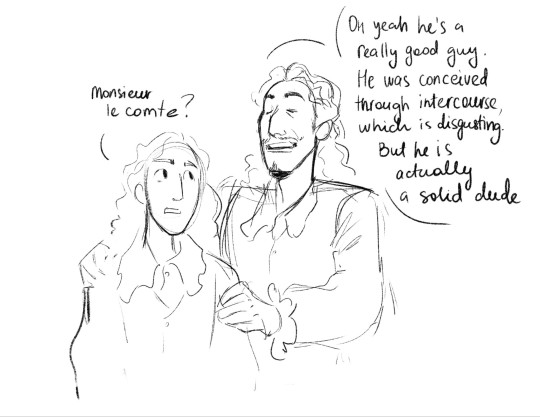
I joined Dumas server and the people there have a galaxy brain so they headcanoned this tweet for Athos and Raoul and I couldn't stop myself from sketching it xD
51 notes
·
View notes
Text

Louis, Anne, Philippe, Mazarin, Beaufort, and most importantly, Pistache
#dumas#vingt ans après#twenty years after#the three musketeers#les trois mousquetaires#louis xiv#anne d'autriche#philippe d'orléans#jules mazarin#francois de bourbon-vendôme#duc de beaufort#17th century#historical clothing
2K notes
·
View notes
Text

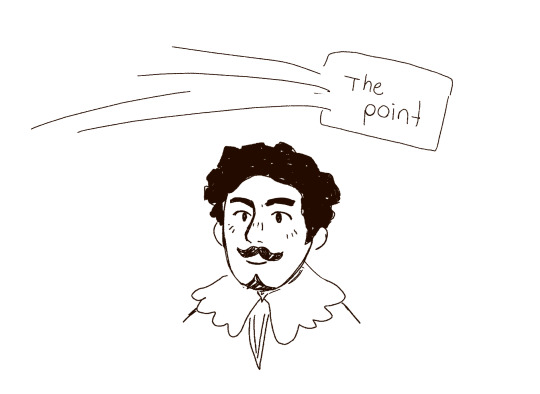
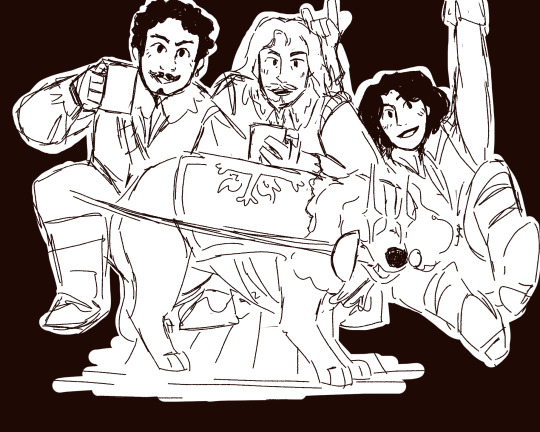
Musketeers doodles
#the three musketeers#twenty years after#things I send to my friends while reading#athos#porthos#aramis#d'artagnan
100 notes
·
View notes
Text
I had a long, crappy day that kept getting crappier until I finally gave up, poured a margarita, and started listening to the audiobook of Twenty Years After, and damn, if Dumas didn't fix me.
9 notes
·
View notes
Text
So I’ve been LOVING the new english translations of The d’Artagnan Romances (Three Musketeers, Twenty Years After, Le Vicomte de Bragelonne) and while waiting for his edition of the next book in the Ten Years Later chunk I found out that he is releasing the chapters serially online RIGHT NOW!
https://musketeerscycle.substack.com/p/court-of-daggers
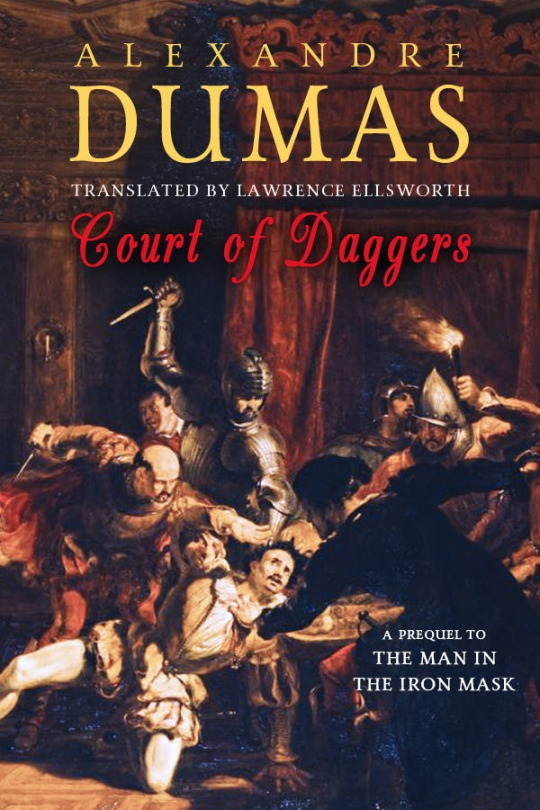
Like you can be actively reading the story as a weekly serial the way it was originally published!!! This is such a cool flippin thing for them to be doing and I’m even more hyped than I already was!
#the three musketeers#Twenty Years After#L3M#D'Artagnan#d'artagnan romance#You mean along with looking forward to new releases from my favorite author#I get to read them in the same fashion they were originally published?!#wieshfsaeiuhwfowr#alexandre dumas#dumas
54 notes
·
View notes
Text
When the Inseparables split up:
Aramis: Athos, we should assassinate the cardinal.
Athos: Aramis! That’s immoral. We should speak to the proper authorities and explain what he’s done.
Aramis: They’ll arrest us.
Athos: So?
Aramis: *facepalms*
Meanwhile, D’Artagnan and Porthos:
D’Artagnan: Porthos, in five minutes, knock that man out.
Porthos: Okay. Then what?
D’Artagnan: I’ll tell you in five minutes.
Porthos: Okay.
#the three musketeers#twenty years after#the inseparables#incorrect quotes#tell me that it’s really incorrect though i dare you#athos#aramis#porthos#d’artagnan#winter reads things
69 notes
·
View notes
Text
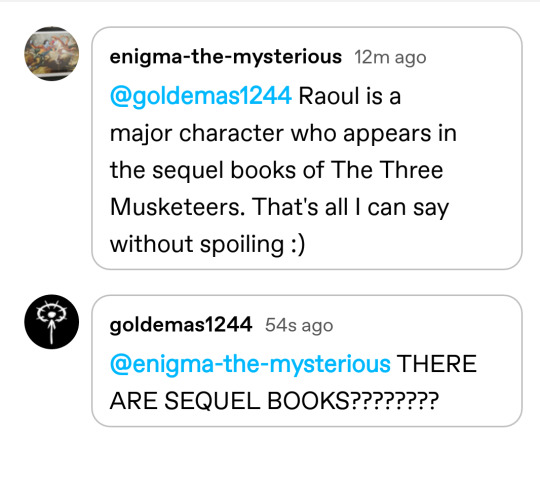
My favourite genre of reaction is when people discover that Alexandre Dumas was kind enough to grace us with sequel books to the exhilarating novel that is The Three Musketeers. Happy reading, nerds! You are in for an emotional ride!
#the three musketeers#alexandre dumas#original post#lol#not incorrect quotes#twenty years after#the man in the iron mask#athos#aramis#porthos#d'artagnan#porthos du vallon
52 notes
·
View notes
Text
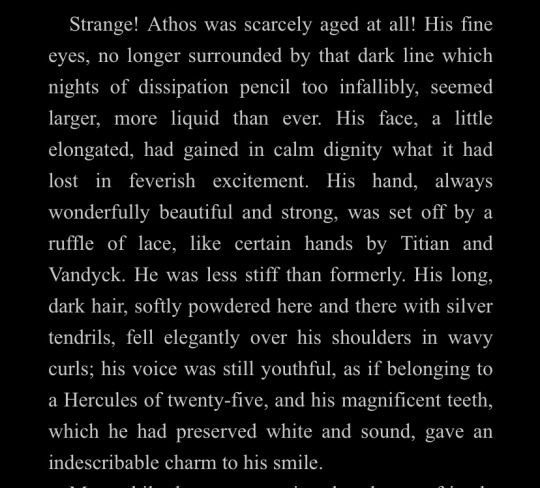
HOLLERING HOOTING IT IS THE MOMENT
#musketeers#the three musketeers#athos#twenty years after#my posts#i have had this scene memorised for like 4 years
8 notes
·
View notes